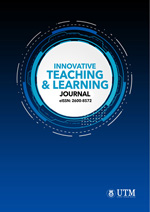Unmasking Reliable News: An Investigation of University Students' Search for Trustworthy Information during the Pandemic
DOI:
https://doi.org/10.11113/itlj.v7.116Keywords:
Fake news, facts, social media, University Students, news sourcesAbstract
The COVID-19 pandemic has been accompanied by a deluge of misinformation and falsehoods about the virus, which have made it challenging to discern facts from fake news. This study aims to investigate the correlation between university students' background and their knowledge of fake news, as well as their perception of their ability to distinguish between facts and fake news. Data was collected through an online Google Form as the pandemic intensified, and it became imperative to contain the spread of COVID-19. This study utilised quantitative cross sectional survey design with purposive sampling to select active social media users who are studying full time programs from a private higher learning institution as the research samples. The collected data of 261 respondents was then analysed using Social Science Statistical Software (SPSS) and Excel. The study's findings reveal that most university students have a commendable level of knowledge about fake news, which empowers them to differentiate between factual information and fake news. However, the study also indicates that the level of education of college students does not significantly affect their knowledge of fake news or their ability to recognize the differences between fake news and facts. Furthermore, the research demonstrates that there is a positive correlation between knowledge of fake news and the ability to distinguish between fake news and real news. In conclusion, this study's results suggest that university students possess a good understanding of fake news and are capable of differentiating it from factual information. The findings imply that there is a need to prioritize teaching critical thinking skills to all students to equip them to effectively combat misinformation and fake news.

















